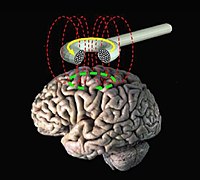
Photo from wikipedia
OBJECTIVE Repetitive transcranial magnetic stimulation (rTMS) is an emerging treatment for neuropsychiatric disorders. Patients in rTMS treatment typically receive concomitant psychotropic medications, which affect neuronal excitability and plasticity and may… Click to show full abstract
OBJECTIVE Repetitive transcranial magnetic stimulation (rTMS) is an emerging treatment for neuropsychiatric disorders. Patients in rTMS treatment typically receive concomitant psychotropic medications, which affect neuronal excitability and plasticity and may interact to affect rTMS treatment outcomes. A greater understanding of these drug effects may have considerable implications for optimizing multi-modal treatment of psychiatric patients, and elucidating the mechanism(s) of action (MOA) of rTMS. METHOD We summarized the empirical literature that tests how psychotropic drugs affect cortical excitability and plasticity, using varied experimental TMS paradigms. RESULTS Glutamate antagonists robustly attenuate plasticity, largely without changes in excitability per se; antiepileptic drugs show the opposite pattern of effects, while calcium channel blockers attenuate plasticity. Benzodiazepines have moderate and variable effects on plasticity, and negligible effects on excitability. Antidepressants with potent 5HT transporter inhibition reduce both excitability and alter plasticity, while antidepressants with other MOAs generally lack either effect. Catecholaminergic drugs, cholinergic agents and lithium have minimal effects on excitability but exhibit robust and complex, non-linear effects in TMS plasticity paradigms. LIMITATIONS These effects remain largely untested in sustained treatment protocols, nor in clinical populations. In addition, how these medications impact clinical response to rTMS remains largely unknown. CONCLUSIONS Psychotropic medications exert robust and varied effects on cortical excitability and plasticity. We encourage the field to more directly and fully investigate clinical pharmaco-TMS studies to improve outcomes.
Journal Title: Journal of affective disorders
Year Published: 2019
Link to full text (if available)
Share on Social Media: Sign Up to like & get
recommendations!